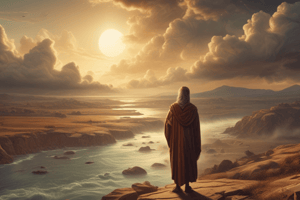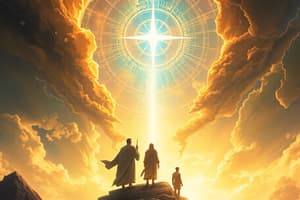Podcast
Questions and Answers
¿Qué es la escatología?
¿Qué es la escatología?
La escatología es la rama de la teología preocupada por los eventos finales en la historia humana y el destino último de la humanidad y la creación.
¿Qué aspectos abarca la escatología judía?
¿Qué aspectos abarca la escatología judía?
La escatología judía enfatiza la restauración del mundo a su estado original de perfección a través de la intervención de Dios, incluyendo el retorno de los judíos a Israel y la construcción del Templo en Jerusalén.
¿En qué se centra la escatología cristiana?
¿En qué se centra la escatología cristiana?
La escatología cristiana se centra en la Segunda Venida de Jesucristo, cuando establecerá su reino eterno, y en la resurrección y el juicio final.
¿Cuál es el concepto principal en torno al cual gira la escatología cristiana?
¿Cuál es el concepto principal en torno al cual gira la escatología cristiana?
¿Qué enseña el islam sobre el fin del mundo?
¿Qué enseña el islam sobre el fin del mundo?
¿Qué creencia es común en las diferentes religiones en relación con los eventos finales?
¿Qué creencia es común en las diferentes religiones en relación con los eventos finales?
¿En qué consiste el apocalipticismo?
¿En qué consiste el apocalipticismo?
¿Qué diferencias existen entre el apocalipticismo bíblico y el apocalipticismo moderno?
¿Qué diferencias existen entre el apocalipticismo bíblico y el apocalipticismo moderno?
¿Qué conceptos discute el budismo en relación con la eschatología?
¿Qué conceptos discute el budismo en relación con la eschatología?
¿Qué diferencias existen en la escatología hindú?
¿Qué diferencias existen en la escatología hindú?
¿Qué importancia tienen las creencias escatológicas en la fe musulmana?
¿Qué importancia tienen las creencias escatológicas en la fe musulmana?
¿Qué papel juegan las creencias eschatológicas en la existencia y nuestro lugar en el mundo?
¿Qué papel juegan las creencias eschatológicas en la existencia y nuestro lugar en el mundo?
Flashcards are hidden until you start studying
Study Notes
Eschatology: Understanding the End of All Things
Eschatology is the branch of theology concerned with the final events in human history, including the ultimate destiny of humanity and creation. It encompasses apocalypticism, which involves belief in divine intervention or supernatural forces leading to cataclysmic change. In this guide, we'll delve into eschatological beliefs across various religions and explore apocalypticism as a key component of eschatology.
Judaism
In Jewish eschatology, there is no concept of salvation after death. Instead, it emphasizes the restoration of the world to its original state of perfection through God's intervention. This includes the return of Jews to Israel, rebuilding the Temple in Jerusalem, and the ushering in of an era of peace known as the Messianic Age.
Christianity
Christian eschatology centers around Jesus Christ's Second Coming, when He will establish His eternal kingdom. Christians believe in resurrection and judgment, where the righteous receive everlasting life while those who have rejected God's salvation experience eternal damnation. Some Christian denominations hold different views regarding the end times, such as premillennialism, postmillennialism, and amillennialism.
Islam
Islam teaches that the world will continue until God Almighty decides. After Prophet Muhammad, two great prophets from among his descendants will appear before the anticipated end: Imam Mahdi (the guided one) and Isa ibn Maryam (Jesus son of Mary). Muslims believe in a physical Last Judgment Day during which everyone will be held accountable for their deeds.
Hinduism
Hindu eschatology is varied, with some texts pointing toward a cyclical view of existence where the universe evolves through periods of creation, preservation, and destruction. Other texts suggest a linear view in which time has a beginning and an end, culminating in a total cosmic dissolution known as Pralaya.
Buddhism
Buddhist teachings do not focus on an individual afterlife or a future messiah. However, they discuss concepts like karma and rebirth within the context of samsara - the cycle of birth, death, and rebirth - potentially providing insight into existential concerns related to eschatological ideas.
Apocalypticism
Apocalypticism refers to the expectation of divine intervention in the form of supernatural or catastrophic events leading to the ultimate transformation of the world. It often involves the interpretation of current events in light of eschatological expectations. Despite many shared elements, interpretations vary widely between religious groups.
Biblical Apocalypticism
The Bible contains numerous passages describing the end of the world as we know it, frequently involving divine retribution against evil forces followed by the establishment of God's kingdom. These accounts can inspire hope for believers or contribute to anxiety over impending doom.
Modern Apocalypticism
Modern apocalypticism extends beyond traditional religious frameworks, incorporating secular perspectives influenced by scientific discoveries, political developments, social changes, and cultural shifts. While rooted in eschatological concepts, these modern interpretations depart from older forms of apocalypticism due to their broader scope and novel explanations.
In conclusion, eschatology serves as a bridge between the temporal and the transcendental, offering insights into the nature of existence and our place within it. Through understanding eschatological beliefs across diverse religions and exploring apocalypticism as a lens onto these concepts, we may deepen our spiritual journeys or broaden our academic pursuits.
Studying That Suits You
Use AI to generate personalized quizzes and flashcards to suit your learning preferences.




